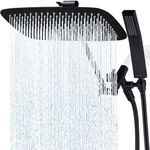Buying Guide for the Best Shower Systems
Choosing the right shower system can make a big difference in your daily routine, turning a simple shower into a relaxing and enjoyable experience. When shopping for a shower system, it's important to think about your bathroom setup, your personal preferences, and the features that will make your showers more comfortable and convenient. Understanding the key specifications will help you compare options and find the best fit for your needs.Type of Shower SystemThe type of shower system refers to the overall design and functionality, such as whether it is a simple showerhead, a dual shower system, or a full shower panel with multiple jets. This is important because it determines the kind of experience you will have—some people prefer a basic overhead shower, while others enjoy the luxury of body jets or a handheld sprayer. To navigate this, think about what you want from your shower: a straightforward rinse, a spa-like massage, or flexibility for tasks like cleaning or bathing children. Your choice should match your daily habits and the space available in your bathroom.
Water Pressure CompatibilityWater pressure compatibility means how well the shower system works with the water pressure in your home. This is crucial because some systems need higher pressure to function properly, while others are designed for low-pressure setups. Shower systems are often labeled for low, medium, or high pressure. If your home has low water pressure, look for systems specifically designed for that, or you may end up with a weak flow. If you have high pressure, you have more options, but make sure the system can handle it to avoid leaks or damage. Always check your home's water pressure before choosing.
Spray Settings and AdjustabilitySpray settings refer to the different ways the water can be delivered, such as a gentle mist, a powerful massage, or a wide rain shower. Adjustability means how easily you can change these settings or direct the water flow. This is important because it affects your comfort and how well the shower meets your needs. Some systems offer just one or two settings, while others have many. If you like variety or have different users with different preferences, look for more settings and easy adjustability. If you prefer simplicity, a basic model may be best.
Installation RequirementsInstallation requirements describe how complex it is to set up the shower system and whether it fits your existing plumbing. Some systems are easy to install and can be attached to your current setup, while others may need professional installation or changes to your plumbing. This matters because it affects how quickly and easily you can start using your new shower, and whether you need extra help. If you want a simple upgrade, look for systems labeled as 'easy install' or 'retrofit.' If you’re planning a full bathroom renovation, you have more flexibility to choose advanced systems.
Material and Build QualityMaterial and build quality refer to what the shower system is made of and how well it is constructed. Common materials include plastic, stainless steel, and brass. This is important because it affects durability, appearance, and how easy it is to clean. Plastic is lightweight and affordable but may not last as long, while metal options are sturdier and often look more stylish. If you want something that will last and look good over time, choose higher-quality materials, especially if your shower gets a lot of use.
Temperature ControlTemperature control is about how you adjust the water temperature, whether through a simple mixer, a thermostatic valve, or digital controls. This is important for safety and comfort, especially if you have children or elderly people at home. Basic systems use manual mixing, while thermostatic controls keep the temperature steady even if someone else uses water elsewhere in the house. If you want extra safety and convenience, look for thermostatic or digital controls. If you’re comfortable with manual adjustment, a basic mixer may be enough.
















